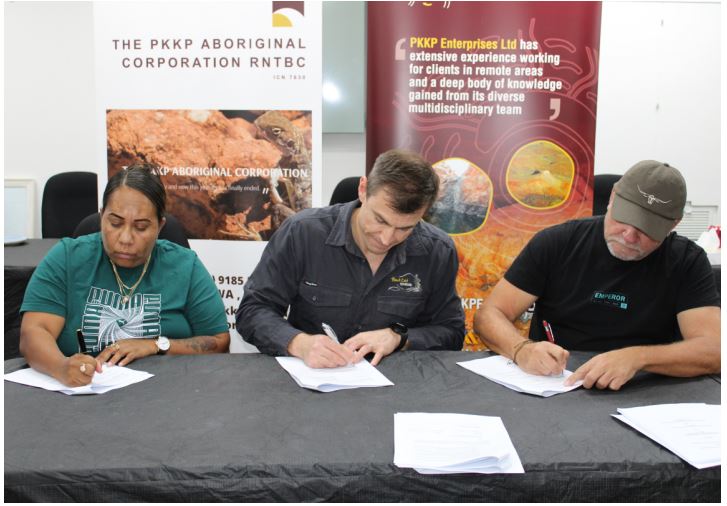PKKP establishes co-management agreement as Aboriginal Cultural Heritage Bill becomes law

Photo: PKKP Director Rehannan Chubby (left), Black Cat Managing Director Gareth Solly and PKKP Chairman Terry Drage (right)
The PKKP Aboriginal Corporation RNTBC has entered into agreements with Black Cat Syndicate Limited for the co-management of mining tenements at the Paulsens Gold Operation.
The agreements aim to ensure the protection and preservation of heritage sites on PKKP country while allowing Black Cat to resume mining operations.
The agreements highlight the core principles of co-management, including greater control and involvement of PKKP traditional owners in mining activities on their land, effective communication between both parties, and clear delineation of mine areas.
PKKP chairman Terry Drage emphasized the significance of these agreements, stating, “Strong cultural heritage legislation is critical for Western Australia, but it cannot replace mutual respect and genuine relationships.”
Drage further acknowledged Black Cat’s commitment to co-management, stating, “Black Cat has been provided a social license to operate on PKKP country as they have acknowledged and committed to co-management.
“This is a great example of how co-management works on the ground when mining proponents and Traditional Owners collaborate.”
The formation of these agreements coincides with the implementation of the Western Australian Cultural Heritage Legislation, which became law on Saturday, despite facing widespread opposition and criticism from various groups including Aboriginal leaders, mining companies and pastoralists.
The bill has been condemned for its failure to involve Traditional Owners in its co-design and for disregarding national best practice standards.
“Critics argue that the legislation does not prioritize the protection and management of Aboriginal cultural heritage and lacks provisions for free, prior, and informed consent.
The legislation requires Traditional Owners to negotiate cultural heritage management plans, with their consent not being mandatory.
“Critics argue that the legislation does not prioritize the protection and management of Aboriginal cultural heritage and lacks provisions for free, prior, and informed consent.
It also allows developers or resource companies the ability to appeal ministerial decisions to the state administrative tribunal, while Traditional Owners have not been granted the same right of appeal.
The agreement between PKKP and Black Cat represents one of the first to be established since the controversial legislation came law.
PDF – PKKP establishes co-management agreement as Aboriginal Cultural Heritage Bill becomes law
Recent Posts
- Launch of Dhawura Ngilan (Remembering Country) Business and Investor Guide on 19 March 2024
- PKKP Annual Plan 2023 – 2024
- PKKP Annual Plan 2023 – 2024
- PKKP establishes co-management agreement as Aboriginal Cultural Heritage Bill becomes law
- Black Cat Strengthens relationship with the PKKP Aboriginal Corporation – Paulsens
- PKKP Aboriginal Corporation ahead of the legislation curve in heritage protection
